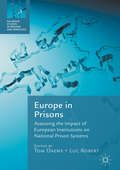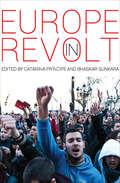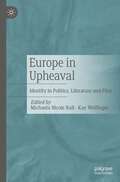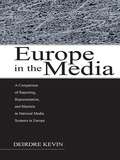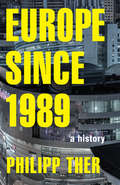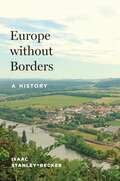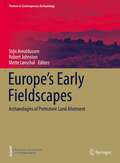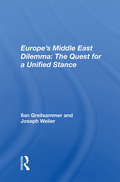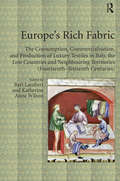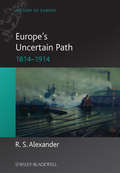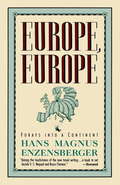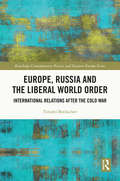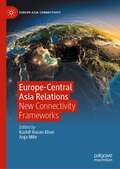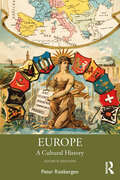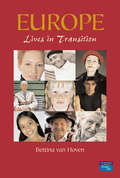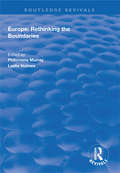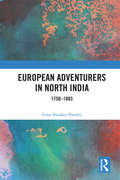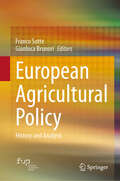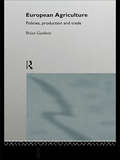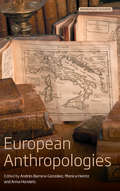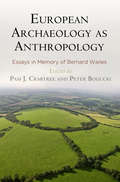- Table View
- List View
Europe in Prisons
by Tom Daems Luc RobertThis volume explores the role that European institutions have come to play in regulating national prisons systems. The authors introduce and contribute to advancing a new research agenda in international penology ('Europe in prisons') which complements the conventional comparative approach ('prisons in Europe'). The chapters examine the impact - if any - that institutions such as the European Committee for the Prevention of Torture and Inhuman or Degrading Treatment or Punishment and the European Court of Human Rights have had on prison policy throughout Europe. With contributions from a wide range of countries such as Albania, Austria, Belgium, Ireland, Norway and Spain, this edited collection offers a wide-ranging and authoritative guide to the effects of European institutions on prison policy.
Europe in Revolt: Mapping the New European Left
by Daniel Finn Stathis Kouvelakis David Broder Leandros Fischer Hilary Wainwright Luke Stobart David Zachariah Panagiotis Sotiris Petter Nilsson Vidar Thorsteinsson Clément Petitjean Alex de Jong Mark BergfeldThis authoritative survey of the new radical left forming across Europe offers &“ammo for the struggles ahead, not to be ignored&” (Susan Weissman, award-winning journalist and editor of Victor Serge). In Greece, Ireland, Portugal, and Spain, the debt crisis that began with the 2008 global recession helped trigger severe austerity measures. These policies, intended to address government debts, only worsened economic conditions. In response, something happened that few outsiders expected: A massive wave of political resistance erupted across Europe. With mainstream parties largely discredited by their support for austerity, room opened for radicals to offer a left-wing alternative. Collecting provocative, informative, and expert insights from leading scholars across the continent, Europe in Revolt examines the key parties and figures behind this insurgency. These essays and articles cover the roots of the social crisis—and the radicals seeking to reverse it—in Cyprus, England, France, Germany, Greece, Iceland, Ireland, Italy, the Netherlands, Portugal, Spain, and Sweden.
Europe in Upheaval: Identity in Politics, Literature and Film
by Michaela Nicole Raß Kay WolfingerThis volume on the term “Europe” is based on a conference that took place in the winter of 2018 at the Carl Friedrich von Siemens Foundation in Munich. Europe in its complexity, in its character of radical change and its power of fascination is of unbroken topicality. At the same time, European identity is endangered by current challenges such as populism and the rise of nationalism. The contributions to the conference address the question of the extent to which contemporary literature and also current films react to these upheavals and to what extent the talk of a crisis in Europe or European integration is perceptible in the areas of literature and film. This book is a translation of the original German 1st edition Europa im Umbruch edited by Michaela Nicole Raß and Kay Wolfinger, published by Springer-Verlag GmbH Germany, part of Springer Nature in 2020. The translation was done with the help of artificial intelligence (machine translation by the service DeepL.com). A subsequent human revision was done primarily in terms of content, so that the book will read stylistically differently from a conventional translation. Springer Nature works continuously to further the development of tools for the production of books and on the related technologies to support the authors.
Europe in an Era of US-China Strategic Rivalry: Challenges and Opportunities from an Outside-in Perspective (Global Power Shift)
by Sebastian BibaThis volume examines some of the major challenges and opportunities for Europe in the light of the intensifying US-China global strategic rivalry. In doing so, the book investigates European roles and behavior in the contemporary US-China-Europe triangular relationship. While the book's focus is on Europe, the contributors originate from, or are based in, the US and China, thus presenting a unique outside-in perspective to the analysis of European conduct in the areas of security, geo-politics, geo-economics, global governance, development, and climate change. Each area is investigated by one American and one Chinese scholar, respectively, presenting the different views held on Europe’s behavior and positioning in the US and China. In addition to providing critical assessments of Europe’s roles and performance as seen through the prism of their respective country, contributors also pose concrete policy recommendations for Europe.The book will appeal to students, scholars, and researchers of political science and international relations, as well as policy-makers interested in a better understanding of Europe's role in the US-China rivalry and its relationship to the two countries.
Europe in the Media: A Comparison of Reporting, Representation, and Rhetoric in National Media Systems in Europe (European Institute for the Media Series)
by Deirdre KevinEurope in the Media draws together the results of several research projects that examined media coverage of European political and cultural affairs and media representations of Europe. The book attempts to outline some of the important debates regarding European integration and to describe the media landscape in which these debates are informed, reflected, and facilitated. The research presented sought to answer several questions, namely the role of the media in the democratic process at the European level and the extent to which the media contributes to and reflects the process of European integration. The book provides a wide scope of comparative analysis, allowing for an extremely interesting overview of the way that national media systems in France, Germany, Ireland, Italy, the Netherlands, Poland, Spain, Sweden, and the United Kingdom approach the issue of European integration. Based on the news output of over 50 media outlets in eight countries, this book contains the original data gathered by experts during two 1-week monitoring periods, as well as data that was collected and coded by experts with reference to the programming of more than 12 major broadcasters in six countries. This volume addresses debates and analysis from the fields of political science in relation to the process of European integration, EU policymaking and public participation and opinion-formation. It also outlines relevant media theory regarding the relationships between the media and democracy, and the media and identity formation. In this way, the book provides a valuable link between these two separate fields of investigation in an area that is of increasing interest to academics, students, politicians, and journalists.
Europe since 1989: A History
by Philipp Ther Charlotte Hughes-KreutzmüllerThe year 1989 brought the fall of the Berlin Wall and the collapse of communism in Eastern Europe. It was also the year that the economic theories of Reagan, Thatcher, and the Chicago School achieved global dominance. And it was these neoliberal ideas that largely determined the course of the political, economic, and social changes that transformed Europe--both east and west--over the next quarter century. This award-winning book provides the first comprehensive history of post-1989 Europe.Philipp Ther--a firsthand witness to many of the transformations, from Czechoslovakia during the Velvet Revolution to postcommunist Poland and Ukraine--offers a sweeping narrative filled with vivid details and memorable stories. He describes how liberalization, deregulation, and privatization had catastrophic effects on former Soviet Bloc countries. He refutes the idea that this economic "shock therapy" was the basis of later growth, arguing that human capital and the "transformation from below" determined economic success or failure. Most important, he shows how the capitalist West's effort to reshape Eastern Europe in its own likeness ended up reshaping Western Europe as well, in part by accelerating the pace and scope of neoliberal reforms in the West, particularly in reunified Germany. Finally, bringing the story up to the present, Ther compares events in Eastern and Southern Europe leading up to and following the 2008-9 global financial crisis.A compelling and often-surprising account of how the new order of the New Europe was wrought from the chaotic aftermath of the Cold War, this is essential reading for understanding Europe today.
Europe without Borders: A History
by Isaac Stanley-BeckerThe contested creation of free movement—for people and goods—in the Schengen area of EuropeEurope is a place of free movement among nations—or is it? The Schengen area, established in 1985 and today encompassing twenty-nine European countries, allows people, goods, and capital to cross borders without restraint. Schengen transformed European life, advancing both a democratic project of transnational citizenship and a neoliberal project of international free trade. But the right of free movement always excluded non-Europeans, especially migrants of color from former colonies of the Schengen states. In Europe without Borders, Isaac Stanley-Becker explores the contested creation of free movement in Schengen, from treatymaking at European summits and disputes in international courts to the street protests of undocumented immigrants who claimed free movement as a human right.Schengen laid the groundwork for the making of a single market and the founding of the European Union. Yet its emergence is one of the great untold stories of modern European history, one hidden in archives long embargoed. Stanley-Becker is among the first to have access to records of the treatymaking—such as letters between France&’s François Mitterrand and West Germany&’s Helmut Kohl—and Europe without Borders offers a pathbreaking account of Schengen&’s creation. Stanley-Becker argues that Schengen gave a humanist cast to a market paradigm; but even in pairing the border crossing of human beings with the principles of free-market exchange, this vision of free movement was hedged by alarm about foreign migrants. Meanwhile, these migrants—the sans-papiers—saw in the promise of a borderless Europe only a neocolonial enterprise.
Europe's Contending Identities
by Andrew C. Gould Anthony M. MessinaHow 'European' are Europeans? Is it possible to balance national citizenship with belonging to the European Union overall? Do feelings of citizenship and belonging respond to affiliations to regions, religions or reactionary politics? Unlike previous volumes about identity in Europe, this book offers a more comprehensive view of the range of identities and new arguments about the political processes that shape identity formation. The founders of European integration promised 'an ever closer union'. Nationalists respond that a people should control their own destiny. This book investigates who is winning the debate. The chapters show that attitudes toward broader political communities are changing, that new ideas are gaining ground, and that long-standing trends are possibly reversing course.
Europe's Early Fieldscapes: Archaeologies of Prehistoric Land Allotment (Themes in Contemporary Archaeology)
by Robert Johnston Stijn Arnoldussen Mette LøvschalThis volume focuses on the development of field systems through time and space and in their wider landscape context, including classical issues pertaining to past land use and management regimes, including manuring, water, land and crop management, and technologies such as slash‐and‐burn cultivation, and use of the ard and plough. This book provides the first comprehensive attempt to bring together and provide a comprehensive insight into the latest prehistoric fieldscape research across Europe. The book raises a broader awareness of some of the main questions and scientific requests that are addressed by scholars working in various fieldscapes across Europe. Themes addressed in this book include (a) mapping and understanding field system morphologies at various scales, (b) the extraction of information on social processes from field system morphologies, (c) the relations between field systems and cultural and natural features of their environment, (d) time-depths and temporalities of usage, and (e) specifics of the underlying agricultural systems, with special attention to matters of continuity and resilience and relation to changing practices. The case-studies explore how to best approach such landscapes with traditional and novel methodologies and targeted research in order to enhance our knowledge further. The volume offers inspiration and guidance for the heritage management of fieldscape heritage – not solely for future scholarly research but foremost to stimulate strategic guidance to frame and support improved protection of evidently vulnerable resources for Europe’s future. This volume is of interest to landscape archaeologists.
Europe's Middle East Dilemma: The Quest For A Unified Stance
by Ilan GreilsammerThis book analyzes the principal landmarks in the evolution of a unified European stance toward the Middle East conflict, placing events in the context of the contemporary political and economic circumstances. It offers a theoretical scheme for the study of European political cooperation. .
Europe's Rich Fabric: The Consumption, Commercialisation, and Production of Luxury Textiles in Italy, the Low Countries and Neighbouring Territories (Fourteenth-Sixteenth Centuries)
by Barbara E. Ainsworth Caroline A. MaceraThroughout human history luxury textiles have been used as a marker of importance, power and distinction. Yet, as the essays in this collection make clear, the term 'luxury' is one that can be fraught with difficulties for historians. Focusing upon the consumption, commercialisation and production of luxury textiles in Italy and the Low Countries during the late medieval and early modern period, this volume offers a fascinating exploration of the varied and subtle ways that luxury could be interpreted and understood in the past. Beginning with the consumption of luxury textiles, it takes the reader on a journey back from the market place, to the commercialisation of rich fabrics by an international network of traders, before arriving at the workshop to explore the Italian and Burgundian world of production of damasks, silks and tapestries. The first part of the volume deals with the consumption of luxury textiles, through an investigation of courtly purchases, as well as urban and clerical markets, before the chapters in part two move on to explore the commercialisation of luxury textiles by merchants who facilitated their trade from the cities of Lucca, Florence and Venice. The third part then focusses upon manufacture, encouraging consideration of the concept of luxury during this period through the Italian silk industry and the production of high-quality woollens in the Low Countries. Graeme Small draws the various themes of the volume together in a conclusion that suggests profitable future avenues of research into this important subject.
Europe's Rich Fabric: The Consumption, Commercialisation, and Production of Luxury Textiles in Italy, the Low Countries and Neighbouring Territories (Fourteenth-Sixteenth Centuries)
by Bart Lambert Katherine Anne WilsonThroughout human history luxury textiles have been used as a marker of importance, power and distinction. Yet, as the essays in this collection make clear, the term 'luxury' is one that can be fraught with difficulties for historians. Focusing upon the consumption, commercialisation and production of luxury textiles in Italy and the Low Countries during the late medieval and early modern period, this volume offers a fascinating exploration of the varied and subtle ways that luxury could be interpreted and understood in the past. Beginning with the consumption of luxury textiles, it takes the reader on a journey back from the market place, to the commercialisation of rich fabrics by an international network of traders, before arriving at the workshop to explore the Italian and Burgundian world of production of damasks, silks and tapestries. The first part of the volume deals with the consumption of luxury textiles, through an investigation of courtly purchases, as well as urban and clerical markets, before the chapters in part two move on to explore the commercialisation of luxury textiles by merchants who facilitated their trade from the cities of Lucca, Florence and Venice. The third part then focusses upon manufacture, encouraging consideration of the concept of luxury during this period through the Italian silk industry and the production of high-quality woollens in the Low Countries. Graeme Small draws the various themes of the volume together in a conclusion that suggests profitable future avenues of research into this important subject.
Europe's Uncertain Path 1814-1914: State Formation and Civil Society (Blackwell History of Europe #12)
by R. S. AlexanderEurope’s Uncertain Path is an introduction to Europe’s turbulent history from 1814 to 1914. It presents a clear narrative of the major political events, set against the backdrop of social, economic, and cultural change. An introduction to Europe’s turbulent history from 1814 to 1914 Provides students with a solid grounding in the main political events and social changes of the period Explains the causes and outcomes of major events: the effect of the emergence of mass politics; the evolution of political ideologies; and the link between foreign and domestic policy Offers balanced coverage of Eastern, Western, and Central Europe Illustrations, maps, and figures enhance student understanding
Europe, Europe: Forays into a Continent
by Hans Magnus EnzensbergerIn this highly acclaimed and entertaining book, already "among the touchstones of the new travel writing" (Newsweek), one of West Germany's leading authors takes us on an insider's tour of Europe in the recent past. Focusing on Italy, Poland, Hungary, Sweden, Spain, and Portugal, he describes how Europe has been moving toward a new identity. Enzensberger makes a witty and knowledgeable traveling companion, delving into surprising corners and byways-from the back alleys of Budapest to the halls of the Italian mint-and striking up conversations with everyone from bankers to revolutionaries, astrologers to apparatchiks. In the process, he suggests that Europe's strength lies increasingly in embracing diversity and improvisation, not bigness and regimentation. He enables us to see with fresh eyes one of the most exciting parts of the world today.
Europe, Russia and the Liberal World Order: International Relations after the Cold War (ISSN)
by Timofei BordachevThis book analyses Russia-Europe/EU relations by exploring their practical essence and conceptualizing them in terms of the main categories of international relations research. It argues that the liberal world order, established in Cold War days, whereby international relations are underpinned by a global balance of power and a highly institutionalized framework of international relations, thereby balancing power and morality, continued after the Cold War, with high hopes in the early 1990s for a new order of security and cooperation for all Europe, including Russia. It goes on to show how the liberal world order has broken down, one manifestation of this being the new conflict between Russia and Europe in recent years, a conflict resulting from the failure of European countries/the EU to acknowledge the actual balance of military, economic and political power, the lack of limits on the policy of European countries in terms of infringing on Russia’s interests, and Russia’s consequent revision, after 1999, of its policy of co-operation. Overall, the book provides huge insight into the nature of Europe-Russia relations.
Europe, Russia and the Liberal World Order: International Relations after the Cold War (Routledge Contemporary Russia and Eastern Europe Series)
by Timofei BordachevThis book analyses Russia-Europe/EU relations by exploring their practical essence and conceptualizing them in terms of the main categories of international relations research. It argues that the liberal world order, established in Cold War days, whereby international relations are underpinned by a global balance of power and a highly institutionalized framework of international relations, thereby balancing power and morality, continued after the Cold War, with high hopes in the early 1990s for a new order of security and cooperation for all Europe, including Russia. It goes on to show how the liberal world order has broken down, one manifestation of this being the new conflict between Russia and Europe in recent years, a conflict resulting from the failure of European countries/the EU to acknowledge the actual balance of military, economic and political power, the lack of limits on the policy of European countries in terms of infringing on Russia’s interests, and Russia’s consequent revision, after 1999, of its policy of co-operation. Overall, the book provides huge insight into the nature of Europe-Russia relations.
Europe-Central Asia Relations: New Connectivity Frameworks (Europe-Asia Connectivity)
by Anja Mihr Kashif Hasan KhanThis book addresses the current state of economic and political development within Central Asia and the importance of European countries and organizations as international actors and supranational organizations for the Central Asian Region (CAR). It aims to provide a better understanding of Central Asia’s multi-faceted relations in rapidly evolving geostrategic dynamics and serves as a timely insight into the contours of Central Asian states’ policies, emerging trends, and significant features of these interactions. The aim is to analyze the main challenges for future between the Europe and Central Asia relations, to make recommendations for improvement, and to identify lines for future research on this matter. It highlights key aspects of current discourses in CAR vis-à-vis the role of European countries and China and other key players. It explores post-Soviet scenarios, considering recent drastic changes in the equation of international relations in general and, more particularly the role of Russia and China vis-à-vis Europe in the CARs. This book covers the different perspectives on the EU’s new strategy (2019), which will contribute to strengthening relations between the two growing regions. It will be beneficial for academics, practitioners, and policymakers.
Europe: A Cultural History
by Peter RietbergenFully revised, updated and extended to include the momentous developments of 2020, this fourth edition of Peter Rietbergen's highly acclaimed Europe: A Cultural History is a major and original contribution to the study of Europe. The book examines the structures of culture in this part of Eurasia from the beginnings of human settlement on to the genesis of agricultural society, of greater polities, of urban systems, and the slow transitions that resulted in a (post-)industrial society and the individualistic mass culture of the present. Using both economic and socio-political analytical concepts, the volume outlines cultural continuity and change in Europe through the lenses of literature, the arts, science, technology and music, to show the continent’s ever-changing identities. In a highly readable style, it expertly contextualizes such diverse and wide-ranging topics as Celtic society, the Roman legal system, the oppositions between ‘elite’ and ‘popular’ culture in pre-industrial Europe, Michelangelo’s world-view, the interaction between the Enlightenment and Romanticism, the growth of a society of time and money, the appeal of fascism and other totalitarian ideologies, and the ways the songs of Sting express late twentieth-century thinking. Structured both chronologically and thematically, the text is distinctive in the attention consistently paid to the many ways Europe has been formed through its contacts with non-European cultures, especially those of Asia and the Americas. This edition concludes with an epilogue that discusses the ways Europe’s recent past – including the long-term efforts at further unification, and the various forms of opposition against it – has been both interpreted and misinterpreted; the importance of globalization; and the major challenges facing Europe in the present, amongst which are the consequences of the pandemic of 2020. With a wide selection of illustrations, maps, excerpts from primary sources and even lyrics from contemporary songs to support its arguments, the text remains the definitive cultural history of Europe for both the general reader and students of European history and culture.
Europe: Lives in Transition
by Tim Unwin Bettina Van HovenFirst published in 2003. Routledge is an imprint of Taylor & Francis, an informa company.
Europe: Rethinking the Boundaries (Routledge Revivals)
by Leslie Holmes Philomena MurrayFirst published in 1999, Europe: Rethinking the Boundaries explores the themes of boundary and identity from cultural, political, sociological and historical perspectives. The volume highlights the multiplicity of approaches and the complexity of the understanding of what is Europe, while at the same time presenting a coherent theme of boundary which is both thought-provoking and comprehensive. It focuses on Europe’s changing boundaries and the "clash of civilisations" thesis, the European transformation of the nation state, rethinking European peripheries and European Union (EU) enlargement, the Mediterranean boundaries of the EU, Balkan boundaries, Europe and the "Islamic threat", German foreign policy and European security, and the neutrality of Austria, Finland and Sweden in the EU. Europe: Rethinking the Boundaries will appeal both to informed generalists and to students and scholars of Europe who seek an analysis of the issue of boundaries from a variety of perspectives. It is a timely collection of up to date commentary and analysis from a team of experts which provides a fresh approach to the discussion of boundaries in Europe. It points to pressing issues facing Europe at a difficult and challenging time.
European Adventurers in North India: 1750–1803
by Uma Shanker PandeyThis book explores how European, particularly French, adventurers shaped early modern India. It highlights the significant contributions of these adventurers in social, political, economic, and intellectual life of north India in the 18th and the 19th centuries. The author examines how the French adventurers played a key role in bringing Western science and ideas to a polity in flux. He examines the role of individuals like René Madec, Sombre, De Boigne, Perron, Gentil, Canaple, Delamarr, Sonson, and Pedrose, who made instrumental contributions in modernising armies of pre-modern states in South Asia. The volume also underlines how French adventurers’ commercial networks developing from their enterprises opened up markets in the heartlands of north India for European consumers. Further, it brings to the fore intellectual pursuits of the leading French figures such as Anquetil Duperron, Polier, Gentil, De Boigne, and Perron, whose engagement with Indian literature opened a new chapter framing studies of the Occident. Rich in French, English, and translated Persian archival resources, this book will be of interest to scholars and researchers of colonial history, early modern history, military history, and South Asian studies.
European Agricultural Policy: History and Analysis
by Gianluca Brunori Franco SotteThis book presents the European Common Agricultural Policy by tracing its crucial stages from its conception to the present days. It reconstructs the negotiating processes that have taken place at the political and institutional level over the years. At the same time, the book brings together the results of analyses made by agricultural policy scholars to propose solutions, and to evaluate the policies adopted and the results they produced. The book takes on a twofold objective: to understand how many of today’s problems have roots whose branches extend back in time, and to draw, from the lessons of history, useful insights for endowing the European Union with an ambitious agricultural and rural development policy, suited to the challenges ahead.
European Agriculture: Policies, Production and Trade
by Brian GardnerThe Common Agricultural Policy (CAP) is central to both economic and environmental developments in Europe. But with the advent of new environmental legislation and political change in Europe the CAP faces increasing pressure to reform. European Agriculture provides a comprehensive breakdown of the workings of the CAP and its impact on farming in Europe. The author discusses every aspect of European agricultural policy, production and trade, from environmental contraints and the impact of biotechnology, to the role of European farming in the world food supply system. Posing direct questions about the recent 1992 agricultural reform, the 1994 GATT agreement and the reasons for the expensive continuation of the CAP, European Agriculture analyses the economic, political and environmental implications of pursuing present farming policy and provides a provocative commentary on the agricultural future of Europe.
European Anthropologies
by Andrés Barrera-González Monica Heintz Anna HoroletsIn what ways did Europeans interact with the diversity of people they encountered on other continents in the context of colonial expansion, and with the peasant or ethnic 'Other' at home? How did anthropologists and ethnologists make sense of the mosaic of people and societies during the nineteenth and twentieth centuries, when their disciplines were progressively being established in academia? By assessing the diversity of European intellectual histories within sociocultural anthropology, this volume aims to sketch its intellectual and institutional portrait. It will be a useful reading for the students of anthropology, ethnology, history and philosophy of science, research and science policy makers.
European Archaeology as Anthropology: Essays in Memory of Bernard Wailes
by Pam J. Crabtree Peter BoguckiSince the days of V. Gordon Childe, the study of the emergence of complex societies has been a central question in anthropological archaeology. However, archaeologists working in the Americanist tradition have drawn most of their models for the emergence of social complexity from research in the Middle East and Latin America. Bernard Wailes was a strong advocate for the importance of later prehistoric and early medieval Europe as an alternative model of sociopolitical evolution and trained generations of American archaeologists now active in European research from the Neolithic to the Middle Ages. Two centuries of excavation and research in Europe have produced one of the richest bodies of archaeological data anywhere in the world. The abundant data show that technological innovations such as metallurgy appeared very early, but urbanism and state formation are comparatively late developments. Key transformative process such as the spread of agriculture did not happen uniformly but rather at different rates in different regions.The essays in this volume celebrate the legacy of Bernard Wailes by highlighting the contribution of the European archaeological record to our understanding of the emergence of social complexity. They provide case studies in how ancient Europe can inform anthropological archaeology. Not only do they illuminate key research topics, they also invite archaeologists working in other parts of the world to consider comparisons to ancient Europe as they construct models for cultural development for their regions. Although there is a substantial corpus of literature on European prehistoric and medieval archaeology, we do not know of a comparable volume that explicitly focuses on the contribution that the study of ancient Europe can make to anthropological archaeology.
